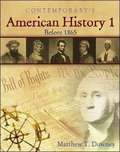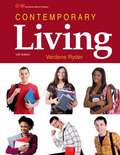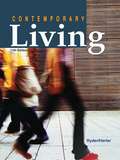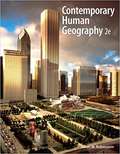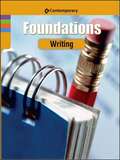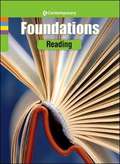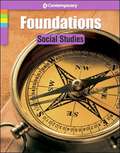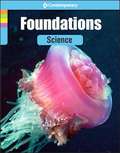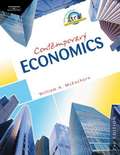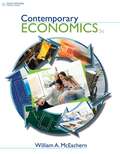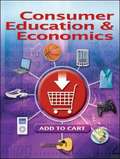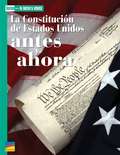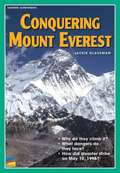- Table View
- List View
More NIMAC books are available at www.nimac.us. If you find your title in the NIMAC and not in Bookshare then please contact us to request it.
Contemporary's American History 1: Before 1865 [Grade 6-12]
by Matthew T. DowneyAmerican History 1: before 1865covers America's story from its beginning through the end of the Civil War. 20 chapters in provide information about American history from economic, geographic, political, religious, technological, social, and cultural perspectives. Student Edition: Engaging four-color design Unit openers with timelines and discussion questions Pre-reading strategies and introduction activities Reading and vocabulary support Small-group activities Writing activities Primary source documents Chapter summaries with review questions End of chapter skill builder
Contemporary's American History 1: Before 1865 [Grade 6-12]
by Matthew T. DowneyAmerican History 1: before 1865covers America's story from its beginning through the end of the Civil War. 20 chapters in provide information about American history from economic, geographic, political, religious, technological, social, and cultural perspectives. Student Edition: Engaging four-color design Unit openers with timelines and discussion questions Pre-reading strategies and introduction activities Reading and vocabulary support Small-group activities Writing activities Primary source documents Chapter summaries with review questions End of chapter skill builder
Contemporary World Studies: People, Places, and Societies, Guided Reading Workbook
by Houghton Mifflin HarcourtNIMAC-sourced textbook
Contemporary Living
by Verdene RyderContemporary Living explores the issues facing students and provides the information needed to make wise decisions. The text addresses topics such as personal development, relationships with family and friends, career options, healthful living, relating to peers, dealing with family crises,and managing family living. Students gain critical-thinking skills while they learn about alternatives to different situations so they can make the best choices for themselves.
Contemporary Living
by Verdene Ryder Marjorie B. HarterWith this new edition, Contemporary Living will continue to be a leading text and popular choice by teachers. This text provides an objective, sensitive presentation of contemporary issues facing today's students. Students will study their development as individuals and family members and learn to identify the attitudes, values, standards, and goals that will influence their decision making. Many new topics have been added to update text content, along with 125 new illustrations.<BR>-- New topics include using the management process; making a career plan; teamwork skills; and strategies for job success.<BR>-- More information is provided on lifespan development, including young adulthood, as well as child guidance techniques.<BR>-- Technology applications have been added throughout, such as using the Internet to find jobs and shopping online.<BR>-- A new end-of-chapter feature called "To Think About" involves topics, questions, and activities requiring critical thinking.
Contemporary Human Geography
by James M. RubensteinContemporary Human Geography is a beautifully crafted, modular springboard into essential human and cultural geography concepts, designed for the contemporary geography student. This brief, innovative text explores current human geography in the bold visual style that distinguishes Dorling Kindersley (DK) publications. Topics within each chapter are organized into modular, self-contained, two-page spreads. Together with the graphics, Rubenstein's efficient writing engages students, presenting information clearly without sacrificing the high-quality geography content essential to students and instructors.
Contemporary Foundations: Writing
by McGraw Hill Wright GroupContemporary'sFoundationsseries helps students improve their basic skills. Each book provides skill instruction, offers interesting passages to study, and furnishes opportunities for practice.Foundationsprovides meaningful contexts for learning, using language which is easy to understand. Foundations: Writingwill help students improve their writing skills, as well as their reading and thinking skills. Part I: Writing helps students practice the four stages of the writing process: Prewriting: planning and organizing Drafting: writing by following a plan Revising: evaluating and rewriting Editing: correcting grammar, mechanics, and usage Students will learn about five types of essays and practice writing each type: Descriptive Essay Personal Narrative How-To Essay Essay of Example Comparison-and-Contrast Essay Part II: Grammar focuses on language skills that writers need to understand. Grammar: nouns, pronouns, verbs, adjectives, and adverbs Punctuation: periods, question marks, exclamation marks, commas, and semicolons Sentence Structure: incomplete sentences, run-on sentences, and comma splices The following special features will help students practice their writing skills. In Your Journal: ideas to think about and write about on your own Language Tip: explanations, pronunciations, study hints, and background information that will help students understand what they read Test Skills: a reminder that this skill is often tested on standardized tests With a Partner: reading, writing, and thinking activities to do with a classmate, family member, or friend Posttest: a test, evaluation chart, and answer key to guage skill mastery Revised Edition Features: New language tips Updated content, including revised passages, updated graphs and images More exercises About the Series: In Foundations: Reading, students will read practical information, nonfiction, poetry, and short stories. They will learn to find the main point and the details; identify fact, opinion, and bias; make inferences; read photographs and cartoons; and understand rhythm, rhyme, plot, and theme. Writing Workshops, Language Tips, and prereading questions are designed to improve reading, writing, and thinking skills. In Foundations: Writing, students will practice the four steps to writing an essay: prewriting, drafting, revising, and editing. They will read and write five kinds of essays: descriptive essays, personal narratives, how-to essays, essays of example, and comparison-and-contrast essays. A language-skills workbook provides grammar, punctuation, and sentence structure practice. In Your Journal, With a Partner, and Language Tipswill help students become better writers, and better readers and thinkers as well. In Foundations: Science, students will learn about the human body, plant biology, physics, chemistry, and Earth science. They will practice putting events in order; reading diagrams, charts, and graphs; using the scientific method; and making comparisons and contrasts. Try It yourself!activities will guide students through simple experiments so they will have a better understanding of what they have been reading about. Writing Workshops and Language Tips will help students use their reading and writing skills to think about science topics. In Foundations: Social Studies, students will learn about world history, U.S. history, civics and government, geography, and economics. They will summarize, make predictions, infer the main idea of cartoons, find information on maps, and read various kinds of graphs. Background Information, Language Tips, and Writing Workshops will let students use what they already know as they read and write about social studies topics. The revised edition includes a new World History chapter. In Foundations: Math, students will practice using whole numbers, money, decimals, fractions, ratios, and percents. Exercises will help students review the addition, subtraction, multiplication, and division facts; round numbers; estimate answers; and solve word problems. Math Notes, On their Calculator, and Language Ti...
Contemporary Foundations: Reading
by McGraw-HillContemporary's Foundations series helps students improve their basic skills. Each book provides skill instruction, offers interesting passages to study, and furnishes opportunities for practice. Foundations provides meaningful contexts for learning, using language which is easy to understand. About Foundations: Reading, Revised Edition: Foundations: Reading will help students improve their reading ability, as well as their writing and thinking skills. Foundations: Reading is divided into four units: Practical Reading: ''survival'' reading that you do everyday. Practical reading includes instructions, advertisements, and explanations. Reading Nonfiction: writing based on facts. Nonfiction includes newspaper and magazine articles, books about real people and real events, and encyclopedia articles. Reading Poetry: verse that captures a person's feelings. Learning to recognize form, rhythm, rhyme, and images will help you read and appreciate poetry. Reading Short Fiction: stories created from an author's imagination. Characters, setting, plot, and theme are important elements in every story. These special features in Foundations: Reading will help students practice language skills: Writing Workshops: detailed instructions that will guide the student through the four-step writing process: prewriting, drafting, revising, and editing Language Tips: explanations, pronunciations, study hints, and background information that will help the student understand what he or she is reading Test Skills: a reminder that this skill is often tested on standardized tests Posttest: a test, evaluation chart, and answer key, to gauge the mastery of each skill. Revised Edition Features: New language tips, Updated content, including revised passages, updated graphs and images, More exercises. About the Series: In Foundations: Reading, students will read practical information, nonfiction, poetry, and short stories. They will learn to find the main point and the details; identify fact, opinion, and bias; make inferences; read photographs and cartoons; and understand rhythm, rhyme, plot, and theme. Writing Workshops, Language Tips, and prereading questions are designed to improve reading, writing, and thinking skills. In Foundations: Writing, students will practice the four steps to writing an essay: prewriting, drafting, revising, and editing. They will read and write five kinds of essays: descriptive essays, personal narratives, how-to essays, essays of example, and comparison-and-contrast essays. A language-skills workbook provides grammar, punctuation, and sentence structure practice. In Your Journal, With a Partner, and Language Tips will help students become better writers, and better readers and thinkers as well. In Foundations: Science, students will learn about the human body, plant biology, physics, chemistry, and Earth science. They will practice putting events in order; reading diagrams, charts, and graphs; using the scientific method; and making comparisons and contrasts. Try It yourself! activities will guide students through simple experiments so they will have a better understanding of what they have been reading about. Writing Workshops and Language Tips will help students use their reading and writing skills to think about science topics. In Foundations: Social Studies, students will learn about world history, U.S. history, civics and government, geography, and economics. They will summarize, make predictions, infer the main idea of cartoons, find information on maps, and read various kinds of graphs. Background Information, Language Tips, and Writing Workshops will let students use what they already know as they read and write about social studies topics. The revised edition includes a new World History chapter. In Foundations: Math, students will practice using whole numbers, money, decimals, fractions, ratios, and percents. Exercises will help students review the addition, subtraction, multiplication, and division facts; round numbers; estimate answers; and solve word problems. Math Notes, On their Calculator, and Language ...
Contemporary Foundations: Social Studies
by Wright Group/McGraw-HillContemporary'sFoundationsseries helps students improve their basic skills. Each book provides skill instruction, offers interesting passages to study, and furnishes opportunities for practice.Foundationsprovides meaningful contexts for learning, using language which is easy to understand. AboutFoundations: Social Studies, Revised Edition : In Foundations: Social Studies, students will learn about world history, U.S. history, civics and government, geography, and economics. They will summarize, make predictions, infer the main idea of cartoons, find information on maps, and read various kinds of graphs. Background Information,Language Tips, andWriting Workshops will let students use what they already know as they read and write about social studies topics. The revised edition includes a new World History chapter. About the Series: In Foundations: Reading, students will read practical information, nonfiction, poetry, and short stories. They will learn to find the main point and the details; identify fact, opinion, and bias; make inferences; read photographs and cartoons; and understand rhythm, rhyme, plot, and theme. Writing Workshops, Language Tips, and prereading questions are designed to improve reading, writing, and thinking skills. In Foundations: Writing, students will practice the four steps to writing an essay: prewriting, drafting, revising, and editing. They will read and write five kinds of essays: descriptive essays, personal narratives, how-to essays, essays of example, and comparison-and-contrast essays. A language-skills workbook provides grammar, punctuation, and sentence structure practice. In Your Journal, With a Partner, and Language Tipswill help students become better writers, and better readers and thinkers as well. In Foundations: Science, students will learn about the human body, plant biology, physics, chemistry, and Earth science. They will practice putting events in order; reading diagrams, charts, and graphs; using the scientific method; and making comparisons and contrasts. Try It yourself!activities will guide students through simple experiments so they will have a better understanding of what they have been reading about. Writing Workshops and Language Tips will help students use their reading and writing skills to think about science topics. In Foundations: Social Studies, students will learn about world history, U.S. history, civics and government, geography, and economics. They will summarize, make predictions, infer the main idea of cartoons, find information on maps, and read various kinds of graphs. Background Information, Language Tips, and Writing Workshops will let students use what they already know as they read and write about social studies topics. The revised edition includes a new World History chapter. In Foundations: Math, students will practice using whole numbers, money, decimals, fractions, ratios, and percents. Exercises will help students review the addition, subtraction, multiplication, and division facts; round numbers; estimate answers; and solve word problems. Math Notes, On their Calculator, and Language Tips will help students improve math skills. The revised edition of Math is a major revision. The language has been updated to make the material even easier to follow than before. Foundations series at a glance
Contemporary Foundations: Science
by Wright Group/McGraw-HillContemporary's Foundations series helps students improve their basic skills. Each book provides skill instruction, offers interesting passages to study, and furnishes opportunities for practice.Foundations provides meaningful contexts for learning, using language which is easy to understand. About Foundations: Science, Revised Edition : In Foundations: Science, students will learn about the human body, plant biology, physics, chemistry, and Earth science. They will practice putting events in order; reading diagrams, charts, and graphs; using the scientific method; and making comparisons and contrasts. Try It yourself! activities will guide students through simple experiments so they will have a better understanding of what they have been reading about.Writing Workshops and Language Tips will help students use their reading and writing skills to think about science topics. About the Series: In Foundations: Reading, students will read practical information, nonfiction, poetry, and short stories. They will learn to find the main point and the details; identify fact, opinion, and bias; make inferences; read photographs and cartoons; and understand rhythm, rhyme, plot, and theme. Writing Workshops, Language Tips, and prereading questions are designed to improve reading, writing, and thinking skills. In Foundations: Writing, students will practice the four steps to writing an essay: prewriting, drafting, revising, and editing. They will read and write five kinds of essays: descriptive essays, personal narratives, how-to essays, essays of example, and comparison-and-contrast essays. A language-skills workbook provides grammar, punctuation, and sentence structure practice. In Your Journal, With a Partner, and Language Tips will help students become better writers, and better readers and thinkers as well. In Foundations: Science, students will learn about the human body, plant biology, physics, chemistry, and Earth science. They will practice putting events in order; reading diagrams, charts, and graphs; using the scientific method; and making comparisons and contrasts. Try It yourself! activities will guide students through simple experiments so they will have a better understanding of what they have been reading about. Writing Workshops and Language Tips will help students use their reading and writing skills to think about science topics. In Foundations: Social Studies, students will learn about world history, U.S. history, civics and government, geography, and economics. They will summarize, make predictions, infer the main idea of cartoons, find information on maps, and read various kinds of graphs. Background Information, Language Tips, and Writing Workshops will let students use what they already know as they read and write about social studies topics. The revised edition includes a new World History chapter. In Foundations: Math, students will practice using whole numbers, money, decimals, fractions, ratios, and percents. Exercises will help students review the addition, subtraction, multiplication, and division facts; round numbers; estimate answers; and solve word problems. Math Notes, On their Calculator, and Language Tips will help students improve math skills. The revised edition of Math is a major revision. The language has been updated to make the material even easier to follow than before.
Contemporary Fiction: Writer's Journal (Amplify Core Knowledge Language Arts, Grade 4 #Unit 6)
by Amplify EducationNIMAC-sourced textbook
Contemporary Economics
by William A. MceachernMcEachern, an economist and teacher, provides an introductory textbook on economics that explains related theory, events, and institutions by using timely real-world examples. Each of the National Content Standards of the National Council on Economic Education is covered. Two new chapters in this edition discuss personal finance, specifically consumer responsibilities and protections and managing money. Annotation ©2007 Book News, Inc., Portland, OR (booknews.com)
Consumer Education & Economics, Sixth Edition
by Ross E. Lowe Charles A. Malouf Annette R. JacobsonConsumer Education & Economicsis a contemporary consumer education program that covers all financial literacy basics: Understanding our economy Managing family and personal finances Understanding and managing credit Making well-informed purchasing decisions
La Constitución de Estados Unidos antes y ahora: Textos Para La Lectura Atenta (Texts Close Reading )
by Benchmark Education Co. Llc StaffNIMAC-sourced textbook
Conservar los alimentos (¡Arriba la Lectura!, Level U #48)
by Phillip SimpsonNIMAC-sourced textbook
Conquering Mount Everest
by Jackie Glassman Alison AdamsFind out about Mount Everest and the daring people who have tried to reach its summit.
Conoce a los perros de la granja Bedlam (¡Arriba la Lectura!, Read Aloud Module 1 #1)
by Jon KatzNIMAC-sourced textbook
Connections: Writing & Language, High School
by Cynthia Clampitt Larkin Page-Jacobs Carol Francis Jo PitkinNIMAC-sourced textbook
